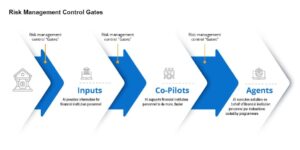On June 6, Acting Comptroller of the Currency, Michael J. Hsu, addressed the 2024 Conference on Artificial Intelligence (AI) and Financial Stability, providing critical regulatory insights on AI. Hsu discussed the systemic risk implications of AI in banking and finance using a “tool or weapon” approach. He noted that while both tools and weapons pose threats to financial stability, they do so in different ways, necessitating distinct analyses.
In his speech, Hsu emphasized that the rapid adoption of technology during periods of change, without corresponding adjustment in controls, allows risks to grow undetected until they culminate in financial crises. Learning from history, he referenced the lack of regulatory controls in derivatives and financial engineering before the 2008 financial crisis, and more recently, the unregulated growth of cryptocurrencies leading to the “Crypto Winter” of 2022.
Toll Gates Are Needed
To avoid repeating such scenarios, of that rather dire history, Hsu advocated for regulators and the industry to proactively identify points where growth and development should pause to ensure responsible innovation and build trust. He argued that well-designed checkpoints could help balance the need for innovation with necessary safeguards to prevent runaway growth.

The evolution of electronic trading provides a valuable case study to consider. Traditionally, trading was manual. Market making eventually transitioned to phone-based systems, with computers providing real-time information, valuations and forecasts for traders. In time, computers took on a more active role, not only providing information but also assisting and guiding traders’ actions, supporting faster execution and more complex strategies. Eventually, algorithms took over entirely, automatically buying and selling securities according to pre-determined instructions without the need for human intervention.
Using the evolution of electronic trading as a reference, Hsu outlined three phases in its history:
- Inputs: Computers provided information for human traders to consider.
- Co-pilots: Software supported and enabled traders to operate more efficiently and swiftly.
- Agents: Computers executed trades autonomously based on algorithms programmed by software developers.
Understanding the Different AI Phases
Hsu highlighted that each phase requires different risk management strategies and controls. For example, mitigating the risk of flash crashes—exacerbated by algorithmic trading—demands more sophisticated controls than those needed when traders are simply receiving information on a computer screen and execute trades manually.
Artificial Intelligence (AI) is following a similar evolutionary path: initially producing inputs for human decision-making, then acting as a co-pilot to enhance human actions, and finally becoming an agent that makes decisions independently on behalf of humans. As AI progresses from an input provider to a co-pilot and ultimately to an autonomous agent, the risks and potential negative consequences of weak controls increase significantly.
For banks interested in adopting AI, establishing clear and effective gates between each phase can help ensure that innovations are beneficial rather than harmful. Before advancing to the next phase of development, banks should ensure that proper controls are in place and accountability is clearly established for the new phase being entered.
Your Expert Partner
Acting Comptroller Hsu’s advocacy for a robust control environment mirrors the guidance provided in the 2021 Supervisory Letter from the OCC, which we discussed in our blog OCC Provides Roadmap for National Banks and Savings Associations To Conduct Crypto Activities.
If you are interested in establishing a new relationship with Perficient or strengthening an existing one, our financial services regulatory, risk and controls, and AI subject matter experts are available to help. We can work with you to enhance your control environment and design checkpoints to ensure your firm remains well-regulated.
Contact us today to discuss your specific needs.
YOU MAY ALSO ENJOY:

